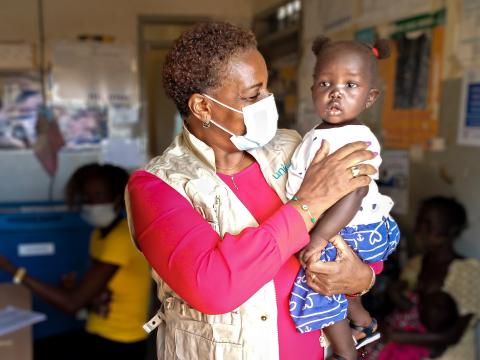New UNICEF Representative Hamida Lasseko urges more forces to join fight against malnutrition

The new UNICEF South Sudan Representative Hamida Lasseko recently visited World Vision’s nutrition site in Munuki Primary Health Care Center in Juba, met with the mothers and children, and nutrition staff.
“Even though I’m proud of the fantastic work UNICEF and World Vision are doing here I wish these benches were empty. I wish there were no mothers with malnourished children. Every child has the right to life, to health, and to develop and thrive”, says UNICEF Representative Hamida Lasseko during the visit.

She adds, “Every time a child gets malnourished, pieces of those rights are taken away from them. We must join forces and put prevention of malnutrition higher up on the agenda, while we continue to treat children in need.”
The South Sudan Humanitarian Needs Report anticipated that an estimated 1.9 million people in the country will suffer acute malnutrition in 2021, 74 percent are children, 26 percent pregnant and lactating women, and 15 percent people with disabilities.

The dire situation has worsened with the COVID-19 pandemic that restricted livelihoods of the most vulnerable, and even the movement of the humanitarian community.
“Job number one for UNICEF South Sudan since the pandemic started has been to ensure the continuation of essential services for children to avoid a new child emergency. 1.4 million children will suffer from acute malnutrition in South Sudan, and the work that is happening at this nutrition center is saving lives”, Lasseko further says.
I’m proud to see how my team in collaboration with World Vision and other partners have been able to find solutions to ensure critical services has continued despite a difficult situation.
In 2020, World Vision’s Juba Urban Nutrition Project supported by UNICEF, and other partners, reached 108,439 children aged 6-59 months with screening for acute malnutrition. A total of 2,004 were identified with severe acute malnutrition and treated through Outpatient Therapeutic Program.
At least 4,957 children with moderate acute malnutrition and treated through a targeted supplementary feeding program. Additionally, at least 56,133 pregnant and lactating women were screened for acute malnutrition. Out of those screened, 2,460 were identified with moderate acute malnutrition and admitted for management in the Targeted Supplementary Feeding Program.

The project has been supporting all acutely malnourished beneficiaries with handwashing soap, WASH, and Covid-19 pandemic preventive messages, as well as personal prevention equipment used by the health and nutrition workers and volunteers as they serve the communities.
“I’m proud to see how my team in collaboration with World Vision and other partners have been able to find solutions to ensure critical services has continued despite a difficult situation”, Lasseko concludes.

“While most of the current nutrition interventions focus on life-saving management of acute malnutrition, our aspirations are to ensure that every child is provided with adequate nutrition and no one dies of hunger”, says World Vision Country Director Dr. Mesfin Loha sharing his welcome with the UNICEF Country Representative Lasseko online.
Loha concludes, “With our partnership with UNICEF, World Vision is committed to working hard and make. this a reality to children of South Sudan.”
Watch: COVID-19 One Year On - The pandemic that brought us together

Story by Cecil Laguardia, Advocacy & Communications Senior Manager I Photos by World Vision Juba Urban Project Team